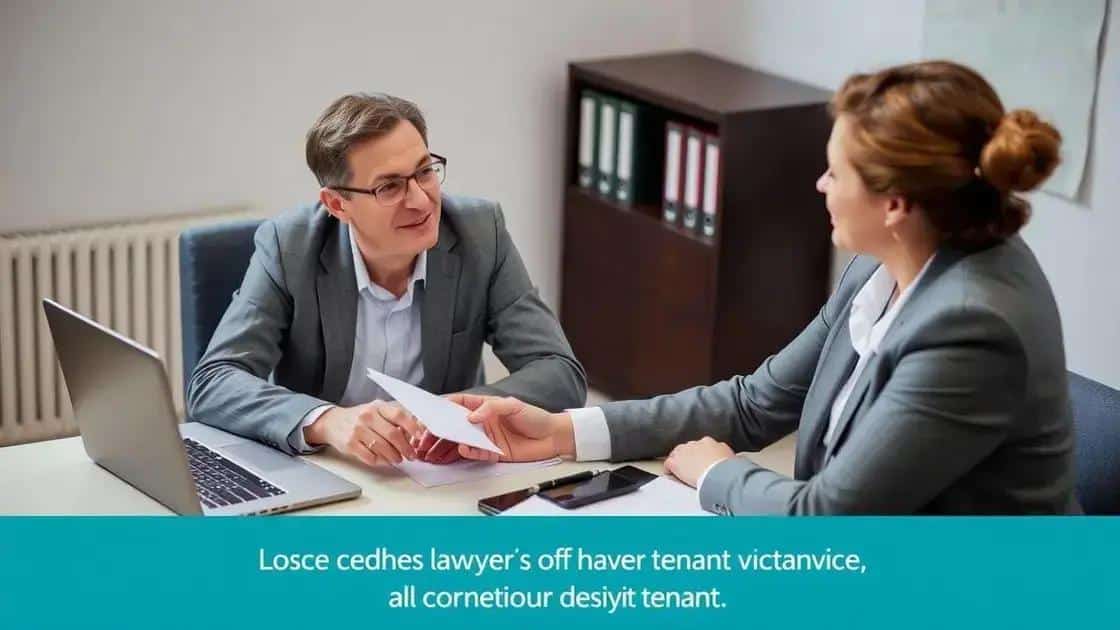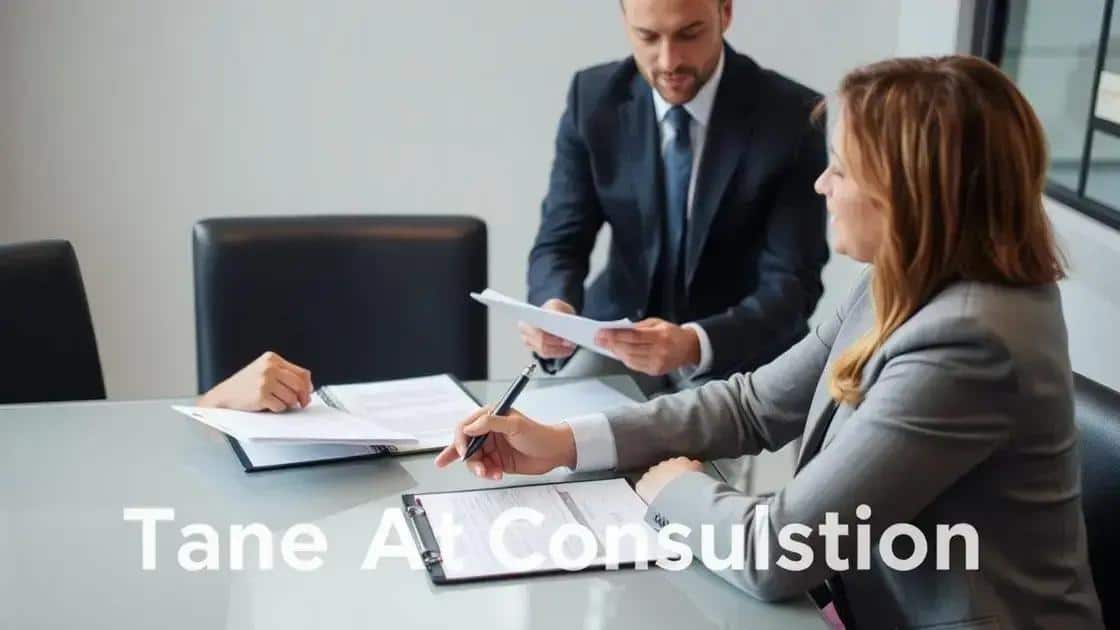Free legal consultation for low-income tenants

Free legal consultation for low-income tenants provides essential guidance on rights, helps resolve housing issues, and connects tenants with valuable resources to navigate their legal challenges effectively.
Are you struggling to navigate housing issues? A free legal consultation for low-income tenants can provide the guidance you need. Let’s explore how these resources can truly help you.
Understanding the need for legal assistance
Understanding the need for legal assistance is crucial for many tenants. Navigating the complexities of legal matters can be overwhelming, especially for those on a tight budget. Help is available through various resources aimed at supporting low-income individuals.
Why Legal Assistance Matters
Legal issues, such as eviction or disputes with landlords, can have serious consequences. Seeking help early can prevent issues from escalating. A free legal consultation for low-income tenants not only provides advice but also helps in understanding rights and options.
Common Issues Tenants Face
Tenants often encounter a variety of problems that require legal intervention. Here are some common issues:
- Eviction notices and their implications
- Unsatisfactory living conditions
- Discrimination based on race, gender, or disability
- Security deposit disputes
Each situation has unique challenges, and knowing how to address them can make a significant difference. It’s essential to be informed and proactive when dealing with these issues.
Accessing Free Legal Services
Many organizations offer free legal services specifically for low-income tenants. These resources can help demystify the legal system and guide individuals through their situations. Look for local community services or legal aid offices that can provide the necessary assistance.
In addition, sometimes, government programs can also help connect tenants with legal support. Remember, reaching out for help is a sign of strength. People often feel stressed and alone, but they don’t have to face their challenges by themselves.
Benefits of legal consultation for tenants

Many tenants wonder about the advantages of seeking legal consultation. The benefits of engaging a lawyer include gaining clarity on housing laws and rights. With expert guidance, tenants can better navigate their challenges, ensuring their voices are heard.
Enhanced Understanding of Rights
One significant advantage is an improved grasp of tenant rights. Legal consultations provide detailed information regarding lease agreements and what landlords can or cannot do. With this knowledge, tenants feel empowered to stand up for themselves.
Effective Communication with Landlords
Another benefit is enhanced communication skills when dealing with landlords. Having legal backing can help tenants express concerns clearly and confidently. This support can lead to more respectful interactions.
Resolving Disputes More Effectively
Legal advice often leads to quicker resolution of disputes. Many issues—such as security deposit returns or eviction notices—can be settled without escalating to court, saving time and reducing stress. Legal professionals often help negotiate favorable terms on behalf of tenants.
- Negotiation of lease terms
- Representation in court if needed
- Access to legal resources and referrals
- Support in understanding legal documents
In addition to these benefits, knowing someone is advocating for your interests can relieve anxiety. Taking proactive steps with legal support can significantly improve a tenant’s situation.
Where to find free legal services
Finding free legal services can seem daunting, but many resources are available for those in need. Start by checking local legal aid organizations, which often provide assistance to low-income tenants. Accessing these services can make a significant difference in housing situations.
Local Legal Aid Organizations
Legal aid organizations are designed to help individuals who cannot afford legal assistance. These organizations often have teams of lawyers who specialize in tenant rights. They can guide you through your options and help you with necessary paperwork.
Community Resources
Your community may offer various resources for legal aid. Local nonprofits and advocacy groups sometimes provide free workshops or legal clinics. These clinics connect tenants with legal professionals who can offer advice on housing issues. It’s a great opportunity to ask questions and get directed support.
Online Legal Services
In today’s digital age, numerous online platforms can assist you with legal issues. Websites dedicated to legal resources can help you find the right services in your area. Many even offer free consultations. Online forums can provide insights and answers to common tenant questions.
- Search for “legal aid” + your city/town
- Visit websites like LawHelp.org
- Contact local bar associations for referrals
- Check social media groups for recommendations
By exploring these pathways, you can access the help you need. Remember, you have rights as a tenant, and knowing where to find support is the first step to asserting them.
How to prepare for your legal consultation

Preparing for your legal consultation is a crucial step in ensuring you get the best possible advice. Understanding what to expect and how to present your situation can greatly impact the outcomes. Being well-prepared allows you to make the most of your time with the lawyer.
Gather Relevant Documents
One of the first things you should do is gather all relevant documents related to your case. This might include lease agreements, eviction notices, communication with your landlord, and any photographs or records of issues in your rental unit. Having these documents on hand will help your lawyer understand your situation better.
Write Down Your Questions
Before your appointment, take the time to write down any questions or concerns you have. This will ensure you don’t forget anything important during the meeting. Make sure to include specific points about your situation that you need clarification on, such as:
- Your rights as a tenant
- Possible legal options available
- Processes involved in resolving your case
- What to expect during legal proceedings
By being organized and clear about your questions, you empower yourself during the consultation. It shows your lawyer that you are serious about your situation and ready to take actionable steps.
Be Honest and Open
When discussing your case, be honest and open with your lawyer. Provide them with all the details, even if they seem minor. This transparency helps them build a stronger case for you. Remember that lawyers are there to help you, and the more they know, the better they can assist you.
Finally, approach the meeting with a positive mindset. Be open to suggestions and ready to discuss potential next steps in your case. Feeling prepared will help you navigate your legal consultation with confidence.
Having access to a free legal consultation for low-income tenants can be a game-changer. It empowers tenants to understand their rights and find solutions for their housing issues. By preparing for your legal consultation, you can maximize your experience and ensure that your concerns are heard. Remember, you are not alone, and there are resources available to help you navigate through your challenges. Reach out for support and take the steps necessary to secure your housing rights effectively.
FAQ – Frequently Asked Questions About Free Legal Consultation for Low-Income Tenants
What should I bring to my legal consultation?
You should bring relevant documents such as lease agreements, eviction notices, and any other communication with your landlord.
How can I find a free legal service provider?
You can search online for local legal aid organizations, visit websites like LawHelp.org, or contact local bar associations.
What types of issues can legal aid help with?
Legal aid can assist with issues like eviction, discrimination, and disputes over lease terms.
Is it important to prepare questions before the meeting?
Yes, writing down your questions helps ensure you cover everything important during your consultation.





